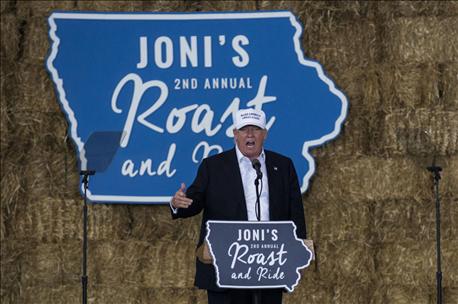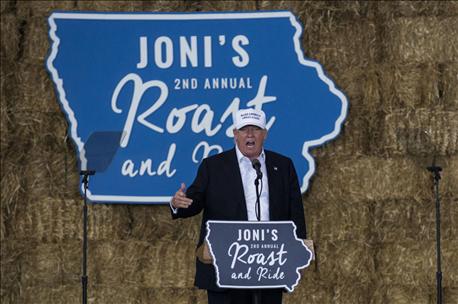
One hope from those in agriculture heading into the elections with president-elect Donald Trump was the notion that he would surround himself with knowledgeable people. Rural America helped get him to the White House, and it appears agriculture has his ear.
Trump put together an Agricultural and Rural Advisory team of over 90 influential agricultural representatives ranging from governors, to past commodity group leaders, to attorneys general to state agriculture secretaries and leaders who have all signed onto 15 talking points shared exclusively with Farm Futures to define the direction Trump will go in his beginning days of office for agriculture.

Trump made some lofty campaign promises. He now has some defined direction in where he wants to go based on talking points agreed upon by his ag advisory committee. Photo source: Zimbio
In some ways, agriculture has many diverse needs and has not always talked in a unified voice. In the days ahead, and few days since the election the vast team has agreed upon some substantial issues to guide Trump on rural issues. And Trump has signed off on the talking points as well.
Charles Herbster, Trump’s national chairman of the advisory committee, has the ear of the president-elect and knows the issues impacting agriculture. The rest of the advisory committee will have a powerful influence in the months ahead in executing these promises.
The talking points carry on some of Trump’s main campaign messages. Trump’s slogan of “Make America Great Again” has its place with farmers, as the talking points identifies that Trump knows that American farmers are the best in the world at growing the food and other products that people need to flourish. And recognizing building up the economy through tax reform will allow all Americans, “especially those involved in agriculture, to keep more money for their families and businesses.”
The tax reform also includes bringing down the corporate tax rate down to 15% and allowing 100% expensing and eliminating the death tax in all of its forms. The talking points also state “death should not be a taxable event and no business should have to be sold in order to pay estate taxes.”
Over-regulation and scaling back unnecessary government involvement was a pillar of Trump’s campaign discussion, and the talking points reflect that as well. “Upon taking office, Trump-Pence will immediately pull back several job-killing Obama/Clinton regulations, including the unlawful WOTUS rule that threatens U.S. agriculture,” the talking points said of the waters of the U.S. rule.
Gary Baise, whose been advising Trump’s national chief policy advisor Sam Clovis, said doing something on WOTUS early on in his presidency would send a real signal to rural America.
Some of the talking points seem to go beyond the typical nuances of agriculture, and instead go after the ongoing influence of those not familiar with agriculture.
One talking point stated, “The Trump-Pence Secretary of Agriculture will defend American agriculture against its critics, particularly those who have never grown or produced anything beyond a backyard tomato plant.”
Another statement defended science-backed decision making. “The Trump-Pence administration will use the best available science to determine appropriate regulations for the food and agriculture sector; agriculture will NOT be regulated based upon the latest trend on social media.”
This begs the question as to whether Trump’s picks for USDA would slow down or stall the writing of the rules for the national mandatory labeling of GMOs.
An additional talking point focused on the need to work with Congress to ensure that the Interstate Commerce Clause is enforced to keep individual states from dictating policy for food growers. Baise shared this was an important topic to members of the advisory committee who were from California and other areas that had been impacted by animal welfare restrictions passed under California’s Prop 2. This week the issue also surfaced with Massachusetts passing a similar ballot initiative (read more here).
Baise explained one reason the Articles of Confederation were scrapped and gave way to the Constitution was because states were setting up tariffs against one another and hindering trade. Measures passed by states which do limit trade between states are against the constitution and agricultural groups are taking a stand.
Everyone is wondering how Trump is going to settle the campaign rhetoric that was opposite what many in agriculture want on the issues of trade and immigration. It’s a tough needle to thread, but the advisory committee has agreed that they’ll be at the table at least in those discussions.
On immigration, the advisory shared that “Mr. Trump recognizes the unique labor challenges facing the American farm community and will include farmers and ranchers in the process of determining the best possible immigration policies.” This seems to be a little softer tone than the build a wall and send all illegal immigrants back home before granting them the ability to stay.
And as for trade, the talking points said the new administration “will negotiate better trade deals for our manufacturing sector while continuing to protect and defend our vital agricultural export markets.” Reports indicated this week that an internal transition team document identified that Trump could begin withdrawing from NAFTA in as little as 200 days after taking office, and it may finalize a decision to drop the TPP in its first 100 days.
Baise said he knows Herbster has kept Trump up-to-speed on the detrimental impact of ag exports without trading with our major partners of Canada, Mexico and China. “Trump is a free trader, but also a fair trader,” Baise said. “We’ve got to make sure better deals are there than what’s being negotiated.” Baise questioned whether agriculture got the best deal within the TPP negotiations.
About the Author(s)
You May Also Like






